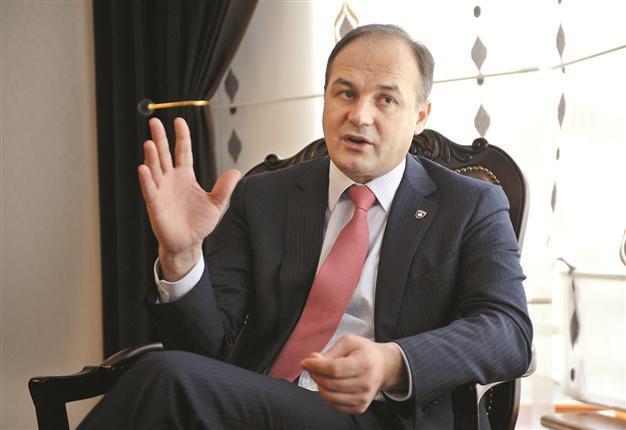Kosovo tests waters for UN membership
ANKARA - Hürriyet Daily News

We are interested to start bilateral reconciliation between Kosovo and Serbia, says Kosovon FM Hoxhaj. DAILY NEWS photo, Selahattin SÖNMEZ
Kosovo has been testing the waters for U.N. membership but is not in a hurry at the moment, according to its foreign minister.“We are not going to take this strategic decision without talking to our friends. We started with Turkey today, [speaking] with [Turkish Foreign Minister Ahmet] Davutoğlu, and with Euro-Atlantic partners who supported us massively over the last year: the U.S., United Kingdom, France, Germany and other European partners,” Kosovo’s foreign minister, Enver Hoxhaj, told the Hürriyet Daily News yesterday in an interview.
Having declared its independence in 2008, Kosovo’s path to U.N. membership had been firmly barred by Russia and China on the Security Council, though nearly half of the member states recognize its statehood.
The foreign minister of the youngest European country cautiously expressed his state’s willingness for U.N. recognition.
“We are not planning to apply for membership in the United Nations soon. We are very proud that Kosovo has been recognized by 97 countries. That’s half of the members of the U.N. This year, each month we received recognition from different corners of the world,” Hoxhaj said, adding that they were working very hard to increase the number of countries who formally recognize Kosovo while seeking membership in international organizations. Kosovo has membership in the IMF, World Bank and European Bank for Reconstruction and Development (EBRD), he noted.
“The time will come when we’ll apply for membership to the U.N., but not now, not soon.” Hoxhaj said they were not expecting to reach sufficient state support in the U.N. to apply for recognition but were waiting for the right timing as it is a “strategic decision.”
As Kosovo declared its independence as part of Yugoslavia’s division, they would use the same model as other countries in the region did to apply for recognition at the U.N. Touching upon the EU-mediated dialogue process between Kosovo and Serbia that launched a normalization of relations, one of the targets of the talks was to strengthen the country’s international position.
Five EU countries have not yet recognized Kosovo. Elaborating on the dialogue process with Serbia, Hoxhaj said they were “working hard in order to use this momentum to convince those five countries.”
Kosovo has “clear territory and clear borders,” Hoxhaj said, adding that Belgrade and Pristine were not discussing status issues “because Kosovo is an independent country.”
Kosovo wants to close a dark chapter of history with Serbia and build normal relations first at a political level, he said. The recent outcome of talks on improving the daily life of their citizens was an agreement on integrated border management.
“By that agreement Serbia recognized the border of Kosovo... for the first time both countries are beginning border crossings between Kosovo and Serbia. We also reached an agreement on freedom of movement for people. Citizens in both countries travel between each other with ID cards only.”
Serbia and Kosovo also agreed on freedom of movement of goods, the minister said.
“Serbia accepted the custom stamps of Kosovo. We are able to export our goods not only to Serbia but through Serbia to the European market.”
Meanwhile, Pristine and Belgrade agreed to open liaison offices in each others’ capitals.
“By the end of the year we are planning to send an ambassador to Belgrade to represent the Republic of Kosovo,” Hoxhaj said.
The nearly 180,000 people missing from the war between the two countries is also on the dialogue agenda.
“We are very interested in going beyond normal relations at a political level. We are interested to start bilateral reconciliation between the two countries and close a dark chapter in history to work for a European future.”
The minister expressed gratitude to Turkey for vehemently supporting his country. During his visit to Ankara, they want to “open a new chapter” for deeper economic relations with Turkey, he said.
















